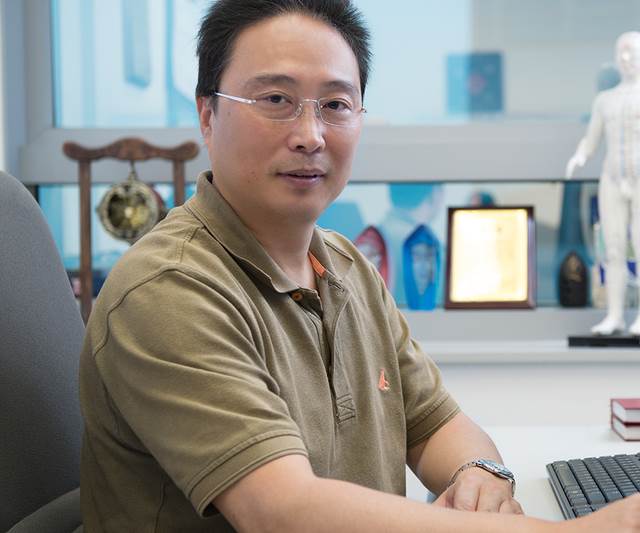Professor Zhongjun Zhou
Zhongjun Zhou, Ph.D. is currently Professor of Biochemistry at the School of Biomedical Sciences in the LKS Faculty of Medicine at The University of Hong Kong.
His main research interests include:
- Aging, Chromatin Dynamics, and Genomic maintenance;
- Stem cell self-renewal and differentiation in development, aging, and cancer;
- Extracellular matrix and cell surface proteinases in the regulation of growth factor signaling in development and diseases.
He graduated from Xiamen University where he earned his Bachelor’s Degree of Science in Biochemistry in 1988. He earned his Master’s Degree of Science in Biochemistry and his Ph.D. in Pathophysiology from Peking Union Medical College in 1993. He also earned his Ph.D. degree in Medical Biochemistry from Karolinska Institute, Sweden in 2002.
After postdoctoral training at the Karolinska Institute, he joined the HKU department as a Research Assistant Professor in December 2002 and became Associate Professor in 2005. He has published more than 40 original papers, reviews, and book chapters. He is Editor-in-Chief of the scientific journal Translational Medicine of Aging and Associate Editor of Mutation Research.
Zhongjun is the co-founding Chair of the Asian Association of Aging Research and the Hong Kong Society for Cell Biology. He has been invited to review manuscripts for many international journals such as Science Translational Medicine, Cell Chemical Biology, and Nature Chemical Biology.
He is the ad hoc external reviewer for many funding agencies including Human Frontier Science Program, Velux Stiftung (Zurich), National Research Foundation (Singapore), Netherlands Organisation for Scientific Research (NWO, the Dutch Research Council), Frontier Science Research Program (Ministry of Science and Technology), Research Grant of Ministry of Science, Technology and Space (Israel), Croatian Science Foundation, MRC UK, Austrian Science Foundation, Austria Natural Science Foundation, Seattle Cancer and Aging Program, and Natural Science Foundation of China.
Zhongjun is interested in understanding the biological functions of extracellular and nuclear matrix proteins. He works on signaling regulation in development, aging, and tumorigenesis using genetically modified mice and human patient tissues. He identified lamin A as the endogenous substrate of metalloproteinase Zmpste24 and demonstrated for the first time that genomic instability is behind the most severe human early aging disease, Hutchinson-Gilford Progeria Syndrome (HGPS). He has demonstrated that the nuclear matrix is not simply a scaffold but a functional structure in regulating chromatin dynamics through modulating epigenetic factors, such as histone deacetylases and acetyltransferases.
An example of Zhongjun’s work that breaks new ground in the science of aging is his recent demonstration of resveratrol’s activation of the longevity protein SIRT1. He demonstrated that lamin A is an endogenous activator of SIRT1 and mediates the activation of SIRT1 deacetylase activity by resveratrol. This important finding clears the cloud over resveratrol as the activator of SIRT1. His works on healthspan extension provide new hope for patients with HGPS and aging-associated diseases. He is a well recognized internationally in the field of biology of aging.
Zhongjun has also made significant contributions to the understanding of membrane-type 1 matrix metalloproteinase function in development and signaling. He demonstrated that MT1-MMP is the major negative Notch signaling regulator to maintain lymphocyte differentiation. In addition, he beautifully showed the cross-talk between ADAM and MMP in regulating FGFR2 signaling and osteogenesis. His recent work revealed MT1-MMP as an endogenous inhibitor of lymphangiogenesis.
Read the list of some of his most discussed papers:
- Haploinsufficiency of Trp53 dramatically extends the lifespan of Sirt6-deficient mice, 2018
- Lamin a is an endogenous SIRT6 activator and promotes SIRT6-mediated DNA repair, 2015
- HP1α mediates defective heterochromatin repair and accelerates senescence in Zmpste24 -deficient cells, 2014
- Effect of Cocaine on Ion Channels and Glutamatergic EPSCs in Noradrenergic Locus Coeruleus Neurons, 2013
- Depleting the methyltransferase Suv39h1 improves DNA repair and extends lifespan in a progeria mouse model, 2013
- Resveratrol Rescues SIRT1-Dependent Adult Stem Cell Decline and Alleviates Progeroid Features in Laminopathy-Based Progeria, 2012
- Dendritic cell podosomes are protrusive and invade the extracellular matrix using metalloproteinase MMP-14, 2010
- Accelerated ageing in mice deficient in Zmpste24 protease is linked to p53 signalling activation, 2005
- Genomic instability in laminopathy-based premature aging, 2005
- Defective prelamin A processing and muscular and adipocyte alterations in Zmpste24 metalloproteinase-deficient mice, 2002
Read Scientists in Hong Kong map initial anti-aging formula.
Visit his LinkedIn profile, his ResearchGate page, and his Orcid profile.
